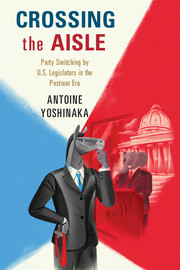Book contents
- Frontmatter
- Dedication
- Contents
- List of Tables
- List of Figures
- Acknowledgments
- PART I
- 1 Legislative Party Switching in the United States: An Introduction
- 2 Party Switching: A Theoretical Framework
- PART II
- PART III
- PART IV
- Appendix A Excluded “Pseudo-Switchers”
- Appendix B Details about Elite Interviews
- Appendix C Data Sources for Chapter 3
- Appendix D Data Sources for Chapter 4
- Appendix E Data Sources for Chapter 5
- Appendix F Data Sources for Chapter 6
- References
- Index
2 - Party Switching: A Theoretical Framework
from PART I
Published online by Cambridge University Press: 05 December 2015
- Frontmatter
- Dedication
- Contents
- List of Tables
- List of Figures
- Acknowledgments
- PART I
- 1 Legislative Party Switching in the United States: An Introduction
- 2 Party Switching: A Theoretical Framework
- PART II
- PART III
- PART IV
- Appendix A Excluded “Pseudo-Switchers”
- Appendix B Details about Elite Interviews
- Appendix C Data Sources for Chapter 3
- Appendix D Data Sources for Chapter 4
- Appendix E Data Sources for Chapter 5
- Appendix F Data Sources for Chapter 6
- References
- Index
Summary
Switchers have a difficulty. Democrats are mad at them for leaving, Republicans fault them because they're a Johnny-come-lately. Their old friends hate them and their new friends don't trust them.
– Former Democratic Representative Glen BrowderSwitchers are handicapped from day one…. The old party is unreasonably negative about it, like a suitor who was rejected…. The receiving party, after the fanfare has died down, remains suspicious.
– Congressperson F (Republican nonswitcher interviewed by author)It's not easy to change parties. No. 1, you have to move away from your political base. No. 2, your new party mates aren't always that thrilled. No. 3, it's difficult when you run for office.
– Republican political consultant Ed GillespieThese quotations are an apt synopsis of the main theoretical assumption I make in this book. Having witnessed a number of Democratic officeholders defecting to the Republican Party during the 1990s, former Democratic representative (and political science professor) Glen Browder made his observation after Republicans had approached him about possibly switching sides. What struck Browder was the extent to which many party switchers failed to be embraced immediately by their new party, as well as the animosity felt by former co-partisans they left behind. As a politician from Alabama and a scholar of southern politics, Browder had a front-row seat to appreciate the dynamics surrounding party switching, and he noticed that incumbents who switched parties were often attacked from both sides.
The idea that switching parties entails significant costs is not the dominant paradigm in the literature. To the contrary, the received wisdom is that politicians incur benefits at the polls by switching into the “correct” party in terms of their constituency (Aldrich and Bianco 1992). This intuitively makes sense, as it is reasonable to expect reelection-seeking politicians to bolt to the other party when doing so increases their chances of getting reelected. Policy motives also figure prominently in explanatory models of party switching (Castle and Fett 2000). Yet most politicians, even those in electoral jeopardy or who are cross-pressured ideologically, do not switch parties.
- Type
- Chapter
- Information
- Crossing the AisleParty Switching by US Legislators in the Postwar Era, pp. 22 - 50Publisher: Cambridge University PressPrint publication year: 2015



